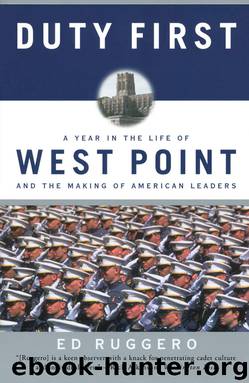Duty First by Ed Ruggero

Author:Ed Ruggero [Ruggero, Ed]
Language: eng
Format: epub, mobi
Tags: Non-Fiction
ISBN: 9780060193171
Amazon: B003WJRE5A
Goodreads: 11808519
Publisher: Harper
Published: 2001-01-01T00:00:00+00:00
Prepare Soldiers for immediate and future military leadership
Instill a competitive spirit within the Zoo that demands physical fitness and athletic prowess
Reinforce a moral and ethical climate based on the Seven Army Values
Protect the force
“The cadets came up with this,” Turner says of the fliers. He steps up to one door and absentmindedly straightens a wrinkled corner of the paper. Turner got this process started and held the cadets responsible, but he doesn’t take credit.
His office is at the end of the long hall. Inside, he flops down on one of the two vinyl, government-issue couches. Like most other Tacs, he’s decorated in the “I-love-me” style: There’s a guidon from the tank company Turner commanded, a group photo of his Ranger school class, a framed certificate of completion of the Special Forces Selection Course at Fort Bragg. The walls are a kind of equivalent of the badges soldiers wear on their uniforms: here’s my military biography, my curriculum vitae.
“This company had a kind of bad track record for academics,” Turner says. “I picked a good firstie to be the academic officer, and I told him: ‘You’ll get graded on your performance. Make it work, you’ll get the A [in military aptitude].’ He set up a system to monitor people who were having problems. Like in physics and chemistry, he identified those yearlings who were doing well. Then he took them up to the Center for Enhanced Performance.”
The center is a laboratory, staffed by civilian educators, that uses the latest in psychology and pedagogy to help cadets boost performance in academics and even in sports. F-2’s academic officer got all of his tutors trained there, then posted a schedule of the exams in major courses. He pushed the chain of command to get involved: Squad leaders and team leaders knew how their people were doing.
The year before Turner arrived, F-2 averaged thirteen or fourteen course failures a semester. In the semester just ended, there were seven. Turner is proud of the record and pleased that it was the cadet leadership that marshaled the company’s talent. The chain of command even did the unpopular stuff, enforcing study conditions in the barracks.
“When some yearlings are goofing off in the hallway and making noise, [the leaders] say, ‘You got something better to do?’ We had all these people worried that grades would fall off, you know, since the plebes had TV cards in their computers, phones in their rooms. Looks like we’re going to have forty-five or so on the Dean’s List.”
The door to the office is open; a cadet comes to the door, pauses.
“What’s up?” Turner asks.
When Turner greets cadets he often slides into Army-speak: The aphorisms and colorful metaphors that pour in a solid stream from some people as soon as they put on camouflage. When Rob Olson—white-bread son of suburban Minneapolis—lapses into this, it is mostly the common Army-Southern hybrid: lots of twang. Turner’s army-speak has a hint of black English. “What’s up?” comes out close to “Waz-up?”
The first class cadet enters the office and hands Turner a three ring binder that says “Pass Book.
Download
This site does not store any files on its server. We only index and link to content provided by other sites. Please contact the content providers to delete copyright contents if any and email us, we'll remove relevant links or contents immediately.
The Art of Coaching Workbook by Elena Aguilar(51199)
Trainspotting by Irvine Welsh(21667)
Twilight of the Idols With the Antichrist and Ecce Homo by Friedrich Nietzsche(18633)
Fangirl by Rainbow Rowell(9251)
Periodization Training for Sports by Tudor Bompa(8273)
Change Your Questions, Change Your Life by Marilee Adams(7783)
This Is How You Lose Her by Junot Diaz(6887)
Asking the Right Questions: A Guide to Critical Thinking by M. Neil Browne & Stuart M. Keeley(5775)
Grit by Angela Duckworth(5615)
Red Sparrow by Jason Matthews(5474)
Paper Towns by Green John(5191)
Room 212 by Kate Stewart(5122)
Ken Follett - World without end by Ken Follett(4734)
Housekeeping by Marilynne Robinson(4448)
The Sports Rules Book by Human Kinetics(4388)
Papillon (English) by Henri Charrière(4274)
Double Down (Diary of a Wimpy Kid Book 11) by Jeff Kinney(4272)
The Motorcycle Diaries by Ernesto Che Guevara(4102)
Exercise Technique Manual for Resistance Training by National Strength & Conditioning Association(4071)
